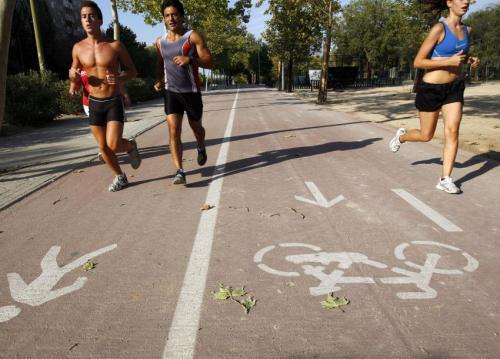Energy drinks cause insomnia and nervousness in athletes

A study analysing the positive and negative effects of energy drinks on athletes has seen that, although in principle their sports performance was seen to improve by between 3% and 7%, there was also an increase in the frequency of insomnia, nervousness and the level of stimulation in the hours following competition.
The consumption of energy drinks has increased in recent years. In the case of athletes, the use of them before practising sport has also risen: more than 50% take them during training and even before competitions.
A four-year study carried out by experts from Camilo José Cela University (UCJC) has evaluated the positive and negative effects of energy drinks on athletes.
In the study, top footballers, climbers, swimmers and basketball, rugby, volleyball, tennis and hockey players took the equivalent of three cans of energy drink or an energy drink placebo before a sports competition. Sporting performance was measured with the use of GPS devices which determined the distance and the speed at which it was covered in team sports.
They also used dynamometers and potentiometers to measure muscle performance in other sports. Published in the British Journal of Nutrition, the results show that athletes increased their sporting performance by between 3% and 7%.
"What is more," as Juan Del Coso Garrigós, one of the authors of the study who is also in charge of the Exercise Physiology Laboratory at the UCJC, explains to SINC, "they ran further in team competitions, specially at higher intensities, which is related to sports performance".
Del Coso adds that "energy drinks increase jump height for basketball players, muscle force and power for climbers and trained individuals, swimming speed for sprinter swimmers, hit force and accuracy for volleyball players and the number of points scored in tennis".
Insomnia and nervousness
These studies not only measured objective parameters of sporting performance, but also asked athletes about their sensations after consuming the energy drink and measured the frequency of the side effects in comparison with the placebo drink.
"Athletes felt they had more strength, power and resistance with the energy drink than with the placebo drink," states the expert. "However, the energy drinks increased the frequency of insomnia, nervousness and the level of stimulation in the hours following the competition".
Their consumption produces an increase in the side effects typically found with other caffeinated drinks. They also found no significant differences between male and female athletes in the perception of positive sensations, nor in the apparition of side effects.
"Caffeinated energy drinks are a commercial product that can significantly increase sporting performance in many sports activities," argues Del Coso. "The increase in their consumption is probably driven by the hard advertising campaigns of energy drink companies related to sports sponsorships".
They do not provide more energy
Energy drinks mainly contain carbohydrates, caffeine, taurine and B vitamins, with little difference in the quantities and ingredients amongst the main energy drink brands.
On the contrary to that indicated by their trade name, energy drinks do not provide more energy than other soft drinks (~40 kcal/100 ml of product), but they do have an 'energising' effect related to the stimulation provided by caffeine.
In fact, none of the other ingredients present in energy drinks and in the amounts in a can of energy drink actually produces a significant effect on physical or cognitive performance.
The concentration of caffeine (32 mg/100 ml of product) present in energy drinks provides a total of 80 mg of caffeine per 250 ml can, although 500 ml cans are currently being sold.
More information: Juan J. Salinero, Beatriz Lara, Javier Abian-Vicen, Cristina Gonzalez-Millán, Francisco Areces, César Gallo-Salazar, Diana Ruiz-Vicente and Juan Del Coso. 'The use of energy drinks in sport: perceived ergogenicity and side effects in male and female athletes'. British Journal of Nutrition, page 1 of 9 DOI: 10.1017/S0007114514002189



















